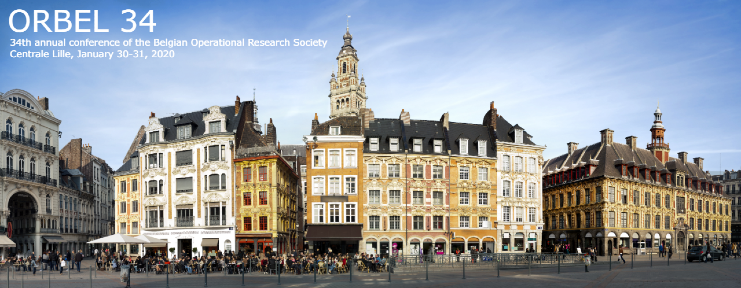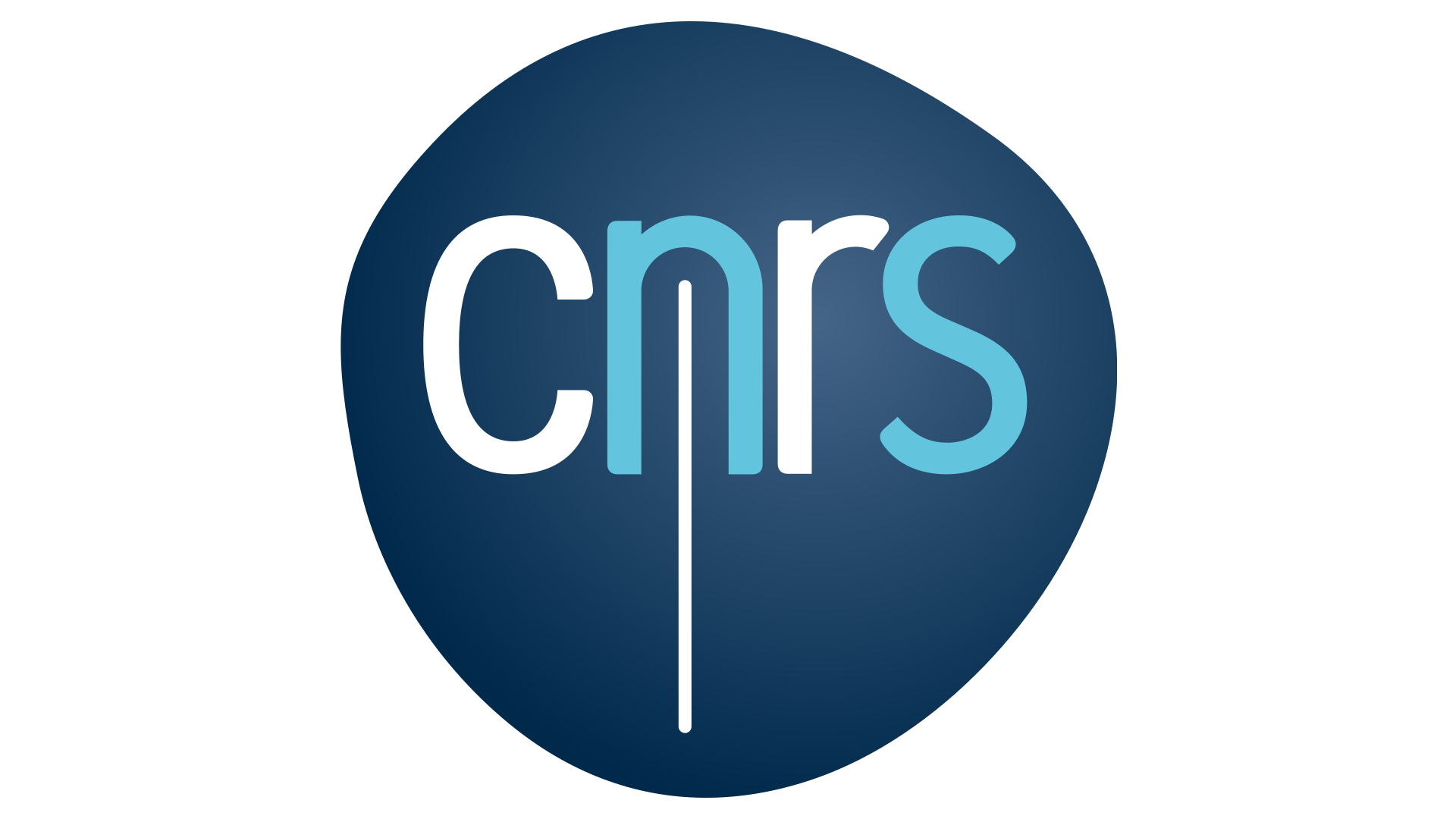 |
| |

|
|
| |
|
Schedule
Thursday, 30 January |
| 08:30-09:10 | Welcome-registration-coffee | B14-B15-B16 |
| 09:10-09:30 | Opening session | Amphi Cuccaroni |
| 09:30-10:30 | Plenary session - Adam Letchford (Chair: Martine Labbé) | Amphi Cuccaroni |
| 10:30-11:20 | Coffee break | B14-B15-B16 |
| 11:20-12:40 | Parallel sessions |
| |
Multi-objective Optimization
Chair: Sara Tari
Room: E501 |
Health-care
Chair: Véronique François
Room: E502 |
Public Transportation
Chair: Javier Duran Micco
Room: E503 |
Global Optimization
Chair: Olivier Rigal
Room: E601 |
Analytics 1
Chair: Rafael Van Belle
Room: E602 |
| 12:40-14:10 | Lunch/ORBEL Board meeting | B14-B15-B16/E501 |
| 14:10-15:10 | Parallel sessions |
| |
Air, Rail and Multimodal Transportation
Chair: Paola Paregrini
Room: E501 |
Game Theory
Chair: Lotte Verdnock
Room: E502 |
Transportation of People
Chair: Yves Molenbruch
Room: E503 |
Multi-level Optimization
Chair: Concepcion Dominguez
Room: E601 |
Analytics 2
Chair: Vedavyas Etikala
Room: E602 |
| 15:10-15:50 | Coffee break | B14-B15-B16 |
| 15:50-16:40 | Parallel sessions |
| |
Sport Timetabling
Chair: Dries Goossens
Room: E501 |
Project Management and Scheduling
Chair: Fan Yang
Room: E502 |
Rich Routing and Graphs
Chair: Alexandre Bontems
Room: E503 |
Logistics
Chair: Yuan Yuan
Room: E601 |
Analytics 3
Chair: Jari Peeperkorn
Room: E602 |
| 16:50-17:30 | ORBEL general assembly | Amphi Cuccaroni |
| 19:00-20:00 | Cocktail | Bar Zango |
| 20:30-23:00 | Dinner | La Terrasse des Ramparts |
Friday, 31 January |
| 09:30-10:30 | Plenary session - Miguel F. Anjos (Chair: Luce Brotcorne) | Amphi Cuccaroni |
| 10:30-11:20 | Coffee break | B14-B15-B16 |
| 11:20-12:40 | Parallel sessions |
| |
Automatic Configuration and Metaheuristics Analysis
Chair: Kenneth Sorensen
Room: E501 |
Real Life and Integrated Problems
Chair: Jeroen Belien
Room: E502 |
Warehouse Management
Chair: Harol Mauricio Gamez
Room: E601 |
Analytics 4
Chair: Noureddine Kouaissah
Room: E602 |
| 12:40-14:10 | Lunch | B14-B15-B16 |
| 14:10-15:10 | Parallel sessions |
| |
Orbel Award
Chair: Jeroen Belien
Room: E501 |
Optimization
Chair: Julien Dewez
Room: E502 |
Trucking Optimization
Chair: Hatice Çalik
Room: E601 |
Analytics 5
Chair: Diego Olaya
Room: E602 |
| 15:10-15:50 | Coffee break | B14-B15-B16 |
| 15:50-16:50 | Parallel sessions |
| |
Learning and Optimization
Chair: Johan Van Kerckhoven
Room: E501 |
Lot-sizing and Inventory
Chair: Philippe Chevalier
Room: E502 |
Rich Routing
Chair: Cristian Aguayo
Room: E601 |
| 17:00-17:15 | ORBEL award and closing session | Amphi Cuccaroni |
| 17:15-18:30 | Closing cocktail | B14-B15-B16 |
|
Thursday 11:20 - 12:40 Multi-objective Optimization
Room E501 - Chair: Sara Tari
Thursday 11:20 - 12:40 Health-care
Room E502 - Chair: Véronique François
Thursday 11:20 - 12:40 Public Transportation
Room E503 - Chair: Javier Duran Micco
Thursday 11:20 - 12:40 Global Optimization
Room E601 - Chair: Olivier Rigal
Thursday 11:20 - 12:40 Analytics 1
Room E602 - Chair: Rafael Van Belle
Thursday 14:10 - 15:10 Air, Rail and Multimodal Transportation
Room E501 - Chair: Paola Pellegrini
Thursday 14:10 - 15:10 Game Theory
Room E502 - Chair: Lotte Verdnock
Thursday 14:10 - 15:10 Transportation of People
Room E503 - Chair: Yves Molenbruch
Thursday 14:10 - 15:10 Multi-level Optimization
Room E601 - Chair: Concepcion Dominguez
Thursday 14:10 - 15:10 Analytics 2
Room E602 - Chair: Vedavyas Etikala
Thursday 15:50 - 16:50 Sport Timetabling
Room E501 - Chair: Dries Goossens
Thursday 15:50 - 16:50 Project Management and Scheduling
Room E502 - Chair: Fan Yang
Thursday 15:50 - 16:50 Rich Routing and Graphs
Room E503 - Chair: Alexandre Bontems
Thursday 15:50 - 16:50 Logistics
Room E601 - Chair: Silia Mertens
Thursday 15:50 - 16:50 Analytics 3
Room E602 - Chair: Jari Peeperkorn
Friday 11:20 - 12:40 Automatic Configuration and Metaheuristics Analysis
Room E501 - Chair: Kenneth Sorensen
Friday 11:20 - 12:40 Real Life and Integrated Problems
Room E502 - Chair: Jeroen Belien
Friday 11:20 - 12:40 Warehouse Management
Room E601 - Chair: Harol Mauricio Gamez
Friday 11:20 - 12:40 Analytics 4
Room E602 - Chair: Noureddine Kouaissah
Friday 14:10 - 15:10 Orbel Award
Room E501 - Chair: Jeroen Belien
Friday 14:10 - 15:10 Optimization
Room E502 - Chair: Julien Dewez
- New Multi-Step Conjugate Gradient Method for Optimization
Issam Moghrabi (Gulf University for Science and Technology)
Co-authors: Issam A.R. Moghrabi
Abstract:
Conjugate Gradient methods (CG) are a class of methods for solving large unconstrained optimization problems. Their storage requirements are rather minimal compared to other methods as they do not store any matrices. Such methods have been used in a variety of domains to solve nonlinear optimization problems as well as systems nonlinear equations. The methods have proven their effectiveness in applications such as Image restoration using a conjugate gradient-based adaptive filtering and Brain Magnetic Resonance Images Segmentation. While such methods converge in at most n iterations on quadratic functions for exact line searches, they are also used to minimize non-quadratic functions and inexact line searches. In the context of minimizing non-quadratic functions, the methods need to be restarted when certain criteria is met On the other hand, multi-step methods are secant-like techniques of the quasi-Newton type that, unlike the classical methods, construct nonlinear alternatives to the quantities in the so-called Secant equation. Multi-step methods instead utilize data available from the m most recent iterations and thus create an alternative to the Secant equation with the intention of creating better Hessian approximation that induce faster convergence to the minimizer of the objective function f. The methods, based on reported numerical results published in several research papers related to the subject, have introduced substantial savings in both iteration and function evaluation counts. Encouraged by the successful performance of the methods, we explore in this paper using them in developing a new Conjugate Gradient (CG) algorithm. CG methods gain popularity on big problems and in situations when memory resources are scarce. The numerical experimentations on the new method are encouraging and open venue for further investigation of such techniques to explore their merits in a multitude of applications. The method requires less storage to implement than other known methods. This saving in resources is especially appreciated on large problems. Other choices for the parameters used in the construction of the search directions are under consideration to determine whether the numerical performance of the method can be improved further. There also remains the issue of developing automatic restart criteria that provides appropriate switching among several options. The global convergence properties of such methods are also under study.
- Constrained Binary Quadratic PRoblems? No.... There is EXPEDIS
Nicolo Gusmeroli (TU Dortmund)
Co-authors: Angelika Wiegele
- Computing lower bounds on the nonngative rank using a nested polytopes formulation
Julien Dewez (Université catholique de Louvain)
Co-authors: François Glineur
Friday 14:10 - 15:10 Trucking Optimization
Room E601 - Chair: Hatiz Çalik
Friday 14:10 - 15:10 Analytics 5
Room E602 - Chair: Diego Olaya
Friday 15:50 - 16:50 Learning and Optimization
Room E501 - Chair: Jorik Jooken
Friday 15:50 - 16:50 Lot-sizing and Inventory
Room E502 - Chair: Philippe Chevalier
Friday 15:50 - 16:50 Rich Routing
Room E601 - Chair: Cristian Aguayo
|
|
| |
ORBEL - Conference chairs: Diego Cattaruzza and Maxime Ogier
|
|
 |
|






